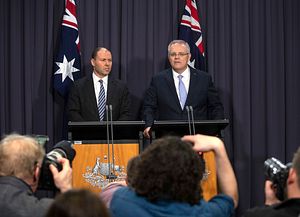The loss of the former prime minister’s parliamentary seat has placed Australia’s Morrison government in a precarious position. “Saving the furniture” looks tougher than ever for the recently installed leader, with the Coalition placed into minority government ahead of elections due by May 2019.
Australian Prime Minister Scott Morrison’s center-right Liberal party has held the “blue-ribbon” Sydney seat of Wentworth since the party’s formation in 1944, with the seat’s previous incumbent none other than former Prime Minister Malcolm Turnbull, who was ousted in August’s party coup.
Declaring he would not stay “hanging around” in national politics like a “miserable ghost” – an attack at former prime ministers Tony Abbott and Kevin Rudd, who both remained lawmakers after their ouster – Turnbull triggered the by-election by quitting Parliament after losing the prime minister post.
The former Liberal leader had held the wealthy electorate with a comfortable 17.7 percent buffer against the main opposition Labor Party.
Yet despite installing former diplomat Dave Sharma as Turnbull’s successor, the Liberals’ campaign in the eastern Sydney electorate was rocked by controversies, including a proposal to follow the U.S. lead and move the nation’s Israel embassy to Jerusalem.
In contrast, independent candidate Kerryn Phelps, a local doctor who had worked in the area for 20 years, presented as the “ideal” challenger.
“She’s a gay woman, a businesswoman, and she’s a Jewish woman,” a longtime Liberal voter told the Australian newspaper.
“She kind of wraps up everything that this community represents: its diversity and its strong core business values.”
The same voter declared Turnbull’s sacking as “a big part” of his decision to vote for Phelps. The rest of the well-heeled electorate apparently agreed.
On Saturday, Wentworth voters delivered a record official swing of nearly 19 percent against a government in a by-election, delivering Phelps victory and with it ending the Coalition’s previous one-seat majority in the lower house.
Both Morrison and Treasurer Josh Frydenberg claimed “angry” Wentworth voters “punished” the party for knifing Turnbull, while the Coalition’s policies on the environment and asylum seekers were also raised as possible causes.
However, others described the electorate as “light years away from middle Australia, where election outcomes are always fought.”
Uphill Battle
Nevertheless, analysis by the Australian of opinion polls since the leadership coup has highlighted the Coalition government’s uphill battle to win re-election.
According to the research, the Liberal-National government could lose up to 25 seats nationwide, installing Labor leader Bill Shorten as prime minister despite his inferior personal polling compared to Morrison.
Other analysis by the Australian Financial Review indicated that “up to 10” Liberal seats could be threatened by a “Wentworth-style backlash from economically conservative, but socially progressive voters attracted to independents.”
While Phelps has declared she has “no intention of bringing down the government,” she has urged action on such issues as “climate change, the treatment of asylum seekers, the future of the [national broadcaster] ABC, [and] a national integrity commission.”
Although now lacking a majority in Parliament’s key chamber, the Morrison government still appears unlikely to be toppled, with other independents seen backing the government in any “no confidence” motion.
ANZ Research said the poll outcome “would make passing legislation more difficult, but this was already a problem given the Senate numbers. We think the main issue with a by-election loss will be on speculation about an early election.”
With the unemployment rate dropping to 5 percent in September, its lowest since 2012, and the federal budget deficit narrowing, Morrison’s campaign focus will undoubtedly be on the government’s economic track record amid the nation’s record-beating expansion.
Yet with house prices tumbling in the nation’s major cities of Sydney and Melbourne and expectations of further falls, the “wealth effect” of rising property prices has suddenly reversed, dampening consumer sentiment.
A slowing world economy and the risk of a U.S.-China trade war also threaten to hit prices of key commodities such as coal and iron ore, crimping Australia’s export income.
“If the economy, house prices and equity prices are all struggling by the time the country goes to the polls, then that would presumably play into the hands of the opposing Labor party,” Capital Economics’ Paul Dales, chief Australia and New Zealand economist, said in an October 12 report.
“Ironically, Labor’s current policies suggest that if it won the election, the economy would perhaps stay weaker for longer.”
Former Foreign Minister Alexander Downer has argued that the Liberals need to develop “a fresh and unexpected agenda… not just an economic agenda” to win re-election. Yet with the clock ticking on the federal election, the Morrison government has precious little time to engineer a reboot.

































